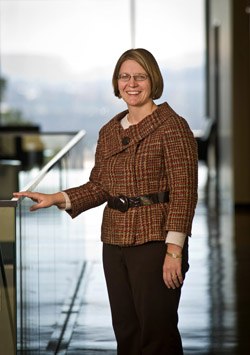NWA to See Job Growth in 2012, Economist Predicts
by January 25, 2012 3:49 pm 94 views

Northwest Arkansas will see greater job growth this year than the rest of the state, economist Kathy Deck said Wednesday at the 2012 business forecast luncheon in Rogers.
About 900 people attended the event at the John Q. Hammons Center. This was the 18th year the University of Arkansas’ Sam M. Walton College of Business has hosted the luncheon.
Deck, director of the Center for Business and Economic Research at the Walton College, jokingly said about 800 people stopped her on her way in to ask, “Do you have some good news for us today?”
And she said she did have good news: Northwest Arkansas will be a primary driver of the state’s economy this year.
Deck, in discussing the employment outlook for the state and region, said that as unemployment continues to fall nationally, it also will fall in Arkansas, but not as quickly.
“We know there are some good things happening, but we also know there are some layoffs coming this year,” she said.
These factors will keep job growth flat statewide. By year’s end, Deck said, she expects the state to have gained only 200 jobs.
In contrast, she expects Northwest Arkansas to net about 2,000 jobs this year.
“As we know, this area is very consumer-driven,” she said.
As people start spending again, business will pick up and jobs become more plentiful. She pointed to the professional services sector as an area that will offer lots of opportunity for job creation.
Deck was joined on the panel of presenters by Paul Thomas, chief economist and manager of market sizing at Intel Corp., who gave the international forecast; and Eugene Flood, executive vice president for diversified financial services at TIAA-CREF, who presented the U.S. forecast.
Thomas said the growth of new technologies, mainly driven by young people, will boost the world economy. The demand for devices that enhance communication and connectedness will create jobs over the next few years, and for that reason, he said, he is cautiously optimistic about the global economy in the short term, and more optimistic about it long term.
Flood said the country’s job landscape is changing, meaning most of the jobs lost in the recession won’t come back, but new jobs will be created as new technologies emerge. He said unemployment will have to drop about 5 percent for the economy to return to full strength.
The U.S. economy will grow about 2 percent this year, Flood said. The biggest unknown, he added, is national budget policy, which hinges on the results of November’s elections.
Robert Hopkins, vice president and senior branch executive at the Federal Reserve Bank of St. Louis’ Little Rock branch, served as moderator for the panel presentations and the question-and-answer session that followed.
